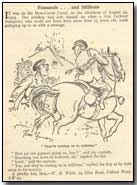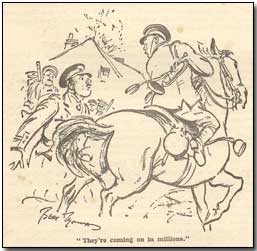Memoirs & Diaries - The Best 500 Cockney War Stories - Fousands... and Millions and Other Stories
 Published in London
in 1921, The Best 500 Cockney War Stories
comprised, in the words of its newspaper publisher (The London Evening
News) "a remembering and retelling of those war days when laughter
sometimes saved men's reason".
Published in London
in 1921, The Best 500 Cockney War Stories
comprised, in the words of its newspaper publisher (The London Evening
News) "a remembering and retelling of those war days when laughter
sometimes saved men's reason".
The collection of short memoirs, some 500 in total, is divided into five categories - Action, Lull, Hospital, High Seas and Here and There. This page contains five stories from Action, led by Fousands... and Millions.
Other sections within the collection can be accessed using the sidebar to the right.
Fousands... and Millions
It was on the Mons-Conde Canal, on the afternoon of August 23, 1914. Our artillery had just opened up when a tiny Cockney trumpeter, who could not have been more than 15 years old, came galloping up to us with a message.
"How are the gunners going on, boy?" said my captain. "Knocking 'em down in fousands, sir," replied the lad. "Good," said the captain.
"Yus, and they're coming on in millions," replied the boy as he rode away to his battery.
A plucky kid, that.
W.H. White, 29 Clive Road, Colliers Wood, S.W.19
Lost: A Front Line
Two or three American officers were attached to our brigade H.Q. on the Somme front.
We were doing our usual four days in the front line when one morning an American officer emerged from the communication trench. Just then the Germans opened out with everything from a 5.9 to rifle grenades.
We squeezed into funk-holes in the bottom of the trench. Presently there was a lull, and the American officer was heard to ask, "Say, boys, where is the front line in these parts?"
"Tich," a little Cockney from Euston way, extracted himself from the earth, and exclaimed, "Strike! J'ear that? Wet jer fink this is - a blinkin' rifle range?"
W. Wheeler (late 23rd Battalion Royal Fusiliers), 55 Turney Road, Dulwich, S.E.
"If Our Typist Could See Us Nah"
Imagine (if you can) the mud on the Somme at its worst. A Royal Marine Artilleryman (a very junior clerk from "Lambeff") was struggling up the gentle slope behind Trones Wood with a petrol tin of precious water in either hand.
A number of us were admiring his manly efforts from a distance when the sudden familiar shriek was heard, followed by the equally familiar bang.
We saw him thrown to the ground as the whizz-bang burst but a few feet from him, and we rushed down, certain that he had "got his."
Imagine our surprise on being greeted by an apparition that had struggled to a sitting posture, liberally plastered with mud, and a wound in the shoulder, who hoarsely chuckled and said: "If our typist could see me nah!"
C.H.F. (W/Opr. attached R.M.A. Heavy Brigade)
Q! Q! Queue
The scene was an observation post in the top of a (late) colliery chimney, 130 ft. up, on the outskirts of Bethune, during the last German offensive of the war.
A great deal of heavy shelling was in progress in our immediate vicinity, and many of Fritz's "high-velocities" were screaming past our lofty pinnacle, which was swaying with the concussion. At any moment a direct hit was possible.
My Cockney mate had located a hostile battery, and after some difficulty with the field telephone was giving the bearing to headquarters.
Faults in the line seemed to prevent him from finishing his message, which consisted of giving the map square (Q 20) being "strafed." The "Q" simply would not reach the ears of the corporal at headquarters, and after many fruitless efforts, using "Q" words, I heard him burst out in exasperation: "Q! Q! Queue!... Blimey! you know-the blinkin' thing wot the pore blighters at home wite abaht for 'mawgarine' in."
B.W. Whayman (late F.S.C., R.E.), 24 Oxford Street, Boston, Lincolnshire
"Fine 'Eads 'Er Salery!"
We were in a deep railway cutting near Gouzeaucourt. Jerry's aeroplanes had found us and his artillery was trying to shift us. On the third day we had run out of cigarettes, so the sergeant-major asked for a volunteer to go to a canteen four miles away.
Our Cockney, a costermonger well known in the East End, volunteered. He could neither read nor write, so we fixed him up with francs, a sandbag, and a list.
Hours passed, the strafe became particularly heavy, and we began to fear our old pal had been hit.
Suddenly during a lull in the shelling far away along the ravine we heard a voice shouting, "'Ere's yer fine 'eads er salery' orl white."
He was winning through.
"Sparks," Lowestoft, Suffolk
Next - The Old Soldier Falls and four other stories
A "Grand Slam" was British slang for an impending attack or battle.
- Did you know?

